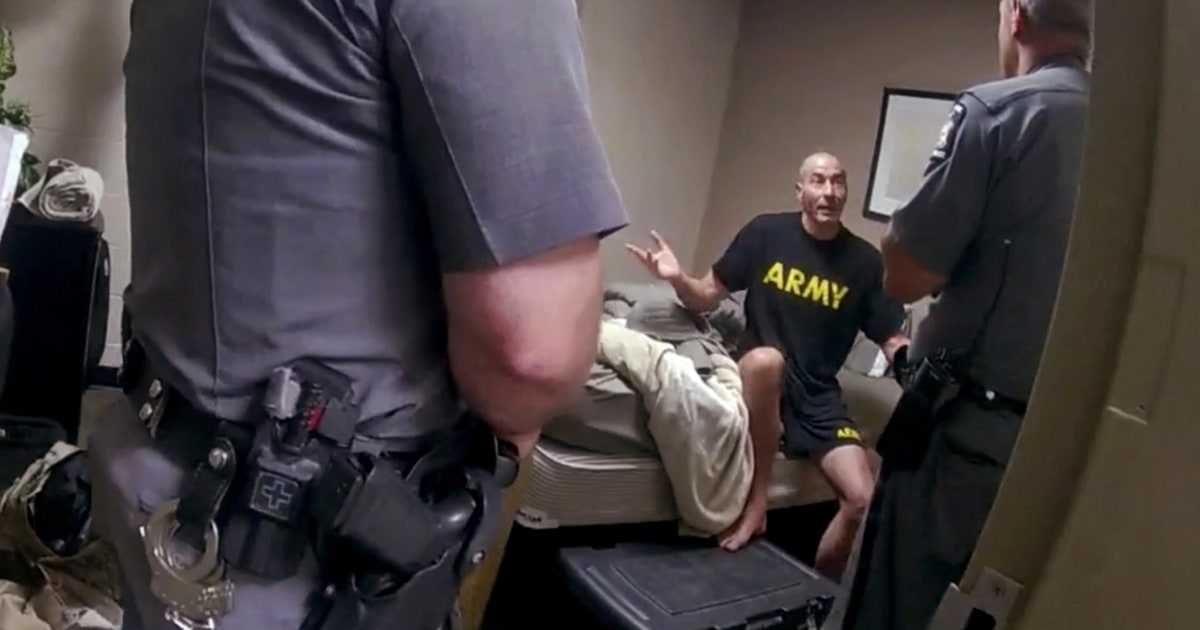By David Sharp and Patrick Whittle —
The Associated Press
An Army reservist who shot and killed 18 people in Maine last year had signs of traumatic brain injuries, according to an analysis of brain tissue by Boston University researchers.
There was degeneration in the nerve fibers that allow communication between different areas of the brain, inflammation and damage to small blood vessels, according to Dr. Ann McKee of the Chronic Traumatic Encephalopathy (CTE) Center at Boston University.
The analysis was released Wednesday by the family of reservist Robert Card.
Card had been an instructor at an Army hand grenade training camp, where he is believed to have been exposed to repeated low-level explosions.
It is unknown whether that caused the brain injury and what role it played in his deteriorating mental health.
McKee did not establish any connection between that injury and the man's violent actions.
This image taken from New York State Police body camera video shows Army Reservist Robert Card, the man responsible for Maine's deadliest mass shooting, at Camp Smith in Cortlandt, New York, on 16 July 2023. AP
"Although I cannot say with certainty that these pathological findings underlie Mr. Card's behavioral changes in the last 10 months of life, based on our previous work, the brain injury
likely played a role in his symptoms
," McKee said. in the statement.
The Pentagon is working to better understand the relationship between “blast overpressure” and effects on brain health.
An Army spokesman did not immediately respond to an email seeking comment.
In their first public appearance since the shooting, Card's family members also apologized for the attack in the statement, saying they are heartbroken for the victims, survivors and their loved ones.
Army reservists who knew Card will testify Thursday before a special commission investigating the deadliest mass shooting in Maine history.
The commission, created by Democratic Gov. Janet Mills, is examining the events surrounding the Oct. 25 shooting, which left 18 people dead at a bowling alley and a Lewiston restaurant and bar.
The panel, which includes former judges and prosecutors, is also reviewing the police response to the shootings.
Both the police and the military were warned that Card was suffering from deteriorating mental health in the months leading up to the shootings.
Some relatives of Card, 40, warned police that he exhibited paranoid behavior and were concerned because he had access to weapons.
In camera videos of police interrogations of reservists before Card's two-week hospitalization in upstate New York last summer, other reservists were also seen expressing concern and alarm about his behavior. and your weight loss.
Card was hospitalized in July after he pushed a teammate and locked himself in a motel room during training.
Later in September, a fellow reserve told an Army superior that
he was worried Card was going to “break out and go into a mass shooting.”
[Four Maine shooting victims were deaf: “Our community is deeply grieving”]
Card was found dead of a self-inflicted gunshot wound following the largest search in state history.
Relatives of the victims, politicians, gun control advocates and others have claimed in the months since the shootings that law enforcement missed several opportunities to intercede and remove the man's weapons.
They have also raised questions about the state's mental health system.
Thursday's hearing in Augusta is the seventh and final scheduled by the commission.
Its president, Daniel Wathen, stated earlier this week in a hearing with victims that an interim report could be published on April 1.
In previous hearings, law enforcement officials have defended the approach they took with Card in the months before the shootings.
Members of the Sagadahoc County Sheriff's Office testified that
state law makes it difficult to remove weapons from a potentially dangerous person.
Maine Democrats want to make changes to the state's gun laws in the wake of the shootings.
Mills wants to do it to allow security forces to go directly to a judge to request a protective custody order to detain a dangerous person and remove their weapons.
Other Maine Democrats have proposed a 72-hour waiting period for most gun purchases.
Gun control advocates held a rally in Augusta earlier this week.
“Gun violence represents a significant public health emergency.
The best way to keep our communities safe is by combining meaningful reform with investments in public health,” said Nacole Palmer, executive director of the Maine Gun Safety Coalition.

